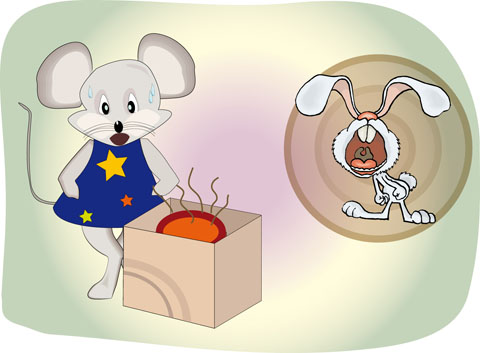Stink mail 臭酸郵件
One day Kathleen plopped down on the couch and turned on the TV. She had just gotten a job as a mail separator at a large company downtown and was happy to finally be able to rest after a long day at work.
The news was on and a special report came on titled, “Something stinks.”

“This just in,” the news anchor said. “A herd of cows unhappy about poor working conditions has been sending cartons of milk to companies around the city. The milk is going bad on route and is causing some stinky problems for unsuspecting recipients.”
“Oh my gosh! What if a milk bomb was sent to one of the bosses at my new company?” Kathleen thought.
She jumped in her car and drove back downtown. It was past six when Kathleen got to the office. Most people had already gone home.
Kathleen started gathering all the boxes she had placed in people’s offices. She sniffed each one, opening any that smelled funny.
When Kathleen got to one box that smelled particularly rancid, she opened it carefully and began to inspect its contents. Just then a man walked in.
“What are you doing with my kimchi!” he shouted…
(MICHAEL KEARNEY, STAFF WRITER)
某天,凱薩琳一屁股坐到沙發上並打開電視;剛得到市中心某大公司郵件收發員工作的她,很開心在辛苦上班了一整天後,終於可以好好休息。
電視正在播新聞,一則特別報導的標題寫著:「不明腐臭物」。
新聞主播說:「現在為您插播一則新聞,一群不滿工作條件惡劣的母牛,一直寄送盒裝牛奶給市區各大企業;牛奶在運送途中開始腐壞,並對那些沒有預期會收到的人,造成好些臭味困擾。」
凱薩琳心想:「喔,我的老天爺啊!要是我新公司的某位主管也收到一份臭奶炸彈怎麼辦?」
她跳上車開回位在市中心的公司,到公司時已經六點多,大部分同事都已經下班回家。
凱薩琳開始把她稍早放到大家辦公室裡的郵包全部收回。她把每個郵包都拿來嗅一嗅,聞到味道怪的就拆開來檢查。
凱薩琳聞到一個郵包發出一股異常腐臭的味道,她小心地拆開來檢查裡面裝了什麼。就在那時,一名男子走了進來。
他大吼:「妳拿我的泡菜做什麼!」(翻譯:袁星塵)

In an effort to fight phone scams, British mobile phone company O2 has introduced Daisy, an AI designed to engage phone con artists in time-wasting conversations. Daisy is portrayed as a kindly British granny, exploiting scammers’ tendency to target the elderly. Her voice, based on a real grandmother’s for authenticity, adds to her credibility in the role. “O2” has distributed several dedicated phone numbers online to direct scammers to Daisy instead of actual customers. When Daisy receives a call, she translates the scammers’ spoken words into text and then responds to them accordingly through a text-to-speech system. Remarkably, Daisy

Bilingual Story is a fictionalized account. 雙語故事部分內容純屬虛構。 Emma had reviewed 41 resumes that morning. While the ATS screened out 288 unqualified, she screened for AI slop. She could spot it a mile away. She muttered AI buzzwords like curses under her breath. “Team player.” “Results-driven.” “Stakeholder alignment.” “Leveraging core competencies.” Each resume reeked of AI modeling: a cemetery of cliches, tombstones of personality. AI wasn’t just changing hiring. It was draining the humanity from it. Then she found it: a plain PDF cover letter. No template. No design flourishes. The first line read: “I once tried to automate my

Every May 1, Hawaii comes alive with Lei Day, a festival celebrating the rich culture and spirit of the islands. Initiated in 1927 by the poet Don Blanding, Lei Day began as a tribute to the Hawaiian custom of making and wearing leis. The idea was quickly adopted and officially recognized as a holiday in 1929, and leis have since become a symbol of local pride and cultural preservation. In Hawaiian culture, leis are more than decorative garlands made from flowers, shells or feathers. For Hawaiians, giving a lei is as natural as saying “aloha.” It shows love and

1. 他走出門,左右看一下,就過了馬路。 ˇ He walked outside, looked left and right, and crossed the road. χ He walked outside and looked left and right, crossed the road. 註︰並列連接詞 and 在這句中連接三個述語。一般的結構是 x, y, and z。x and y and z 是加強語氣的結構,x and y, z 則不可以。 2. 他們知道自己的弱點以及如何趕上其他競爭者。 ˇ They saw where their weak points lay and how they could catch up with the other competitors. χ They saw where their weak points lay and how to catch up with the other competitors. 註:and 一般連接同等成分,結構相等的單詞、片語或子句。誤句中 and 的前面是子句,後面是不定詞片語,不能用 and 連接,必須把不定詞片語改為子句,and 前後的結構才相等。 3. 她坐上計程車,直接到機場。 ˇ She took a cab, which took her straight to the airport. ˇ She took a cab and it took her straight